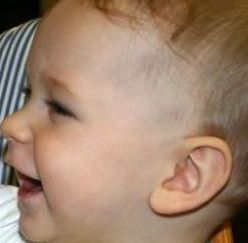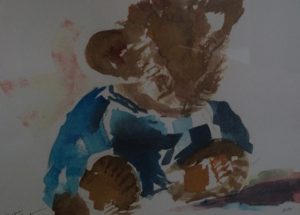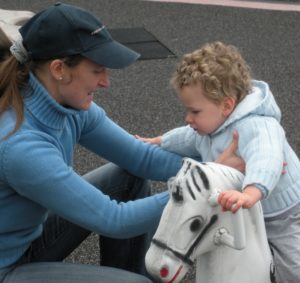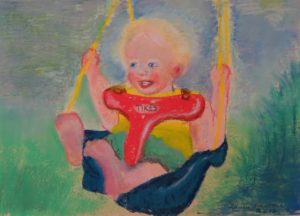How To Help Toddlers Build Concentration and Focus

Keeping toddlers, even the most active, is not as difficult as it may seem. Toddler means “wanderer” which refers to their great curiosity. Screens aren’t needed to respond to that natural tendency to discover other people as well as what things are and how they work!
Just think of your toddler holding a stuffed animal, dropping it, and retrieving it endlessly.

Toddler Story
Here’s a great illustration I experienced recently with my 18 month old granddaughter. First let me say she is VERY active, loves scooting around, climbing and even hopping (sort of). She walked at 10 months so by now she’s a pro. She really doesn’t even toddle anymore but runs, walks, and even kicks a ball with proficiency.
However, she is a great example for this article because despite the love of movement she also loves her hard cover books. She even has a little book shelf and book nook in a corner where she turns the pages and says the words of the pictures she knows even totally by herself.
Of course she loves when someone reads to her as well, but her concentration on her own is a highlight I mention because your topic is focusing on a task “for a little while” and she does this easily for twenty minutes.
But the piece de resistance came Saturday early evening at her first in person Sedar on Passover.
She remarkably sat with 8 others in her high chair with other people, one was 10, one was 12, the rest were adults for nearly two hours. She was so engaged with everyone at the table, even with some social distancing at a long dining table, that when it came to the part of the Seder where everyone responds “Dayenu” which means “that alone would have been enough, for that alone we are grateful” this wonderful little voice said, “Dayenu” every time the rest of us did and then she started saying it entirely with her own initiative.
The capacity to sit still for nearly two hours and actively participate verbally as well as gleefully engaging socially with everyone with appealing sounds and some other words (in English) was astounding and tremendously endearing.
Parenting TIPS
- Social Engagement

She is a delightful example of a child who will focus when she is socially engaged–so that’s my first tip.
- Focusing When Alone to Remember Important Loving People
Secondly, she is fascinated with words and when it’s time to go to sleep at night or for her afternoon nap, alone in her crib in a room by herself you can hear her saying over and over, “Mommy, Daddy, Hazel” which I understand (as a child and adult psychotherapist) this is a way to cleverly keep the image of her parents in her mind because she’s not old enough to reach the developmental stage of understanding when a person is absent that they are not totally gone forever (“object constancy”). So she is highly focused even when she is not socially engaged by others literally although she is virtually in her mind when she is alone. My second tip is to have the same caretaker or parent say every morning and every night “Who am I?” and “Who are you?” so this name saying is repeated frequently at very specific times. Surely, these name-words will be said many times during the day, but this tip is about repeating the most important words at specific times of day every day. This is a social and cognitive and developmental tip.
- Reading with Someone and Alone
Thirdly, read often to the toddler not only the words in the book, but name any object and color on each page. The toddler is learning words this way, colors, and identifying repeated pictures often of animals, people, and objects. If this is done joyfully and frequently, you will discover the little one does it on her own. You’ll hear her saying the words she’s heard over and over and pointing to the things she’s looking at, turning pages one by one. Only use hard cover books because they do not rip and are easy to grip to turn the pages (even more than cloth books).
4.How Things Work
It is not only gross and fine motor play with toys that will focus a toddler, but allowing her to experiment with how things go together and come apart. Choose toys wisely that require the child to figure something out (if I hit the ball, it with the safe toy plastic hammer, it goes down the slide and comes out of the hole). She will not only discover the ‘correct’ way to accomplish the goal as the toy designer intended, but she will quickly realize she can accomplish the goal in other ways (not intended) because she’s learning sequences and cause and effect. How and Why? Because she wants to learn It is natural to want to figure out how things work by trial and error. These cognitive skills grow very quickly and certainly keep your child focused. With the noted toy example, the toddler quickly realizes she doesn’t have to use the hammer (a tool) but can also use her hand to tap the ball and make it follow the intended sequence.
Safety concerns may prevent you from letting the toddler experiment. Observe carefully but try not to interfere. Toddlers usually don’t hurt themselves while figuring things out and if you’re right there just in case, the child is able to experiment and discover.
- Is Praise Needed?
It is not praise itself that is needed, though if you do it be specific to teach language naturally (“You did it. You got the ball to go through the hole.” The child may likely repeat “baw” for ball a few times from then on).
I say it is not praise exactly but rather recognition that pleasures a toddler. Recognition with a smile and tone of joy that is engaging the toddler socially and cognitively and is of course rewarding.Rewarding results in focus and the pleasure of the loved one’s enjoyment of the toddler.
- The Toddler Needs to be Enjoyed
Your toddler most importantly needs to feel loved and consequently loveable. If the child feels this every day even when she has specific frustrations (a gate blocking a long staircase) she will become a happy child with healthy self-esteem, ongoing curiosity which leads to discovery, and as a result, the ability to focus for not little, but reasonably long periods of time!
THIS WEEK’S BRAIN TEASER:

Ask a child or adult, “Name ten (or twenty) things that move as quickly as you can.”
You will hear answers you never expected from all these creative folks.